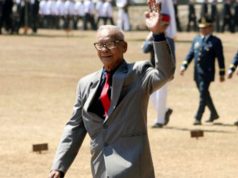
As the world faces a “perfect storm of crises”—the COVID-19 pandemic, attacks on media credibility and online disinformationーit is even more important now for young journalists to verify information they share online and in telling stories.
This was stressed by veteran journalists in a McLuhan Panel Forum on “Philippine Journalism in the New Normal: Challenges and Opportunities” on May 8 on the last of the two-day 2021 Philippine Journalism Research Conference or PJRC.

Christian Esguerra of ABS-CBN News Channel and recipient of last year’s McLuhan Journalism award, noted the diminished role of media in today’s society with the emergence of social media. He said traditional media “no longer dominate the narrative” in the Philippines, their credibility has dropped severely, and journalists are under “relentless attack.”
Esguerra, who also teaches at the University of Sto. Tomas (UST), lamented that journalists have been labelled as prostitutes and low lifes while news organizations are accused of spreading “fake news.”
He urged journalists, especially those who are young digital natives, to fight back by abandoning “timid reporting,” cleansing their ranks and reminding the public of the important role they play in a democracy.
This was echoed by Miriam Grace Go, editor for the Public Trust Agenda of Rappler and 2002 McLuhan Fellow, who reminded young journalists to “be responsible news producers” and “not rely on social media” for newsgathering.
Manny Mogato of OneNews, also a McLuhan award recipient and a Pulitzer Prize winner, shared his experiences covering the war on drugs and how harassment on social media has made the work of journalists even more difficult. He challenged young journalists to “avoid reporting unverified information as gospel truth even when it comes from officials.”
“The lack of transparency and conflicting information should have brought out the best in journalists working in the time of the pandemic,” he said.
Established in 1997 between the McLuhan Program at the University of Toronto and the Embassy of Canada in the Philippines, the Marshall McLuhan Fellowship has been awarded yearly to a recipient embodying outstanding qualities in the field of investigative journalism.
The annual PJRC, organized by the Department of Journalism of the College of Mass Communication at the University of the Philippines (UP), aims to foster research in journalism studies, and the development of investigative journalism among mass communication students.
Launched in 2013, it is traditionally held in UP with a forum on current issues faced by the media and journalists. This year’s entries included research projects by students of the University of Santo Tomas, Polytechnic University of the Philippines and Biliran Province State University, Catanduanes State University, Cavite State University, and Sulu University.
This year’s PJRC was held online for the first time because of the pandemic and attended by students, academics and media practitioners from all over the country. The top awards were given to stories on urban activism, human rights, and press freedom.
Here are the winners of the Chit Estella Student Journalism Awards:
• Academic research: Maria Christina Quiambao (UP Diliman) for her research on the New Normal in the Newsroom: Changes made in the roles and functions of Online and Print Journalists in the Philippines during the COVID-19 pandemic and Carlito Topacio (UST) for his research on Covering Ground Zero: How the Philippine Media portrayed China’s Role in the COVID-19 Pandemic
• Investigative journalism: Agatha Gregorio and Angela Ng (UP Diliman) for their story on Persons Deprived of Liberty, Space, and Safety: An Investigative Study on the BJMP Calabarzon’s Violation of Jail standards in the COVID-19 Pandemic
• Special project (Multimedia): Mary Chelsea Cruz, Maria Christina Quiambao, Hannah Pagaduan (UP Diliman) for their story titled Likha
• Special project (Features): Dominique Nicole Flores (UP Diliman) for her story titled A decade of barricading: Sitio San Roque emerges as home for urban activism
• Photo essay: Special recognition to Ejeerah Miralles, Jonah Leah dematera, Cherry Ann; Vicente Mendoza Jr. and Marjorie Loberanes; and Michelle Mabingna
The award is named after the late UP professor, veteran journalist and VERA Files trustee Chit Estella-Simbulan, who died in a car crash in 2011.
—
VERA Files is put out by veteran journalists taking a deeper look at current issues. Vera is Latin for “true.”









